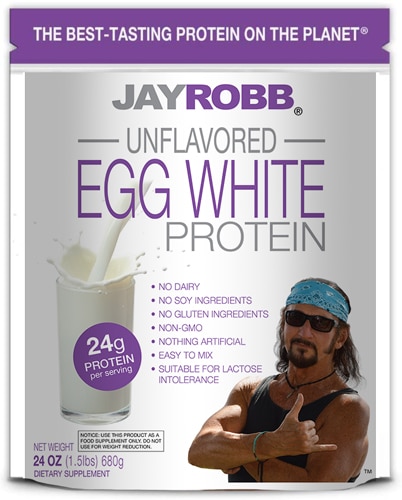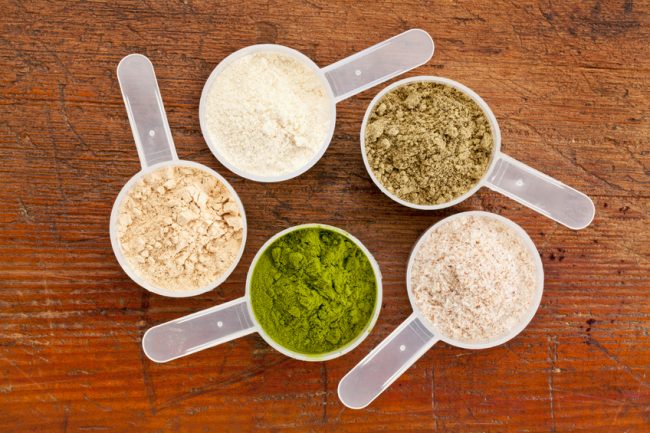It's safe to say that protein powder isn't just for bodybuilders anymore. The health benefits of a high-protein diet have become more and more apparent for all body types and fitness levels. But with all the options out there, deciding which type of protein powder to take can be quite confusing – especially since many modern diets strive to avoid dairy products or prefer to steer clear of animal products altogether. Why is this an issue? Because for a while, protein powders were almost exclusively made with whey protein, which is derived from cow’s milk.
But the rise of specialty diets created a high demand for new breeds of protein – from gluten-free formulas to purely plant-based protein sources. Now, the possibilities are nearly endless – but which one is right for you?
What are the health benefits of protein?
"Protein" isn't just a line on a nutrition labels or something only meatheads obsess over. It’s actually part of our DNA and plays a role in nearly every bodily function. Proteins are whole molecules, which are comprised of several different amino acids. Each amino acid plays a different role – we literally cannot live without them. Adequate amino acid levels are necessary to keep our bodies’ systems healthy. In addition to this, there are nine amino acids (known as the essential amino acids), which we don’t produce and can only be obtained through our diets. You’ll often hear the term “complete” protein. Complete proteins contain all nine essential amino acids.
Is a protein powder really necessary?
While your diet doesn’t need to be particularly high in protein, it’s very important that you consume an adequate amount. For restrictive or allergen-friendly diets, this might be difficult. While various nuts, legumes and grains contain decent amounts of protein, diets calling for little to no meat can certainly benefit from supplementing with a flavorful powder. Keep in mind that a protein powder is not used as a replacement for real food (nothing trumps whole food!). But powders can certainly help balance our nutrition, especially when we’re pinched for time.
High-quality protein powders are isolated from their food sources and are generally low in fat and carbohydrates. For those of us who are in the gym and looking to build muscle or create definition, a little extra protein goes a long way!
So what types of protein are there?
Scroll through the list below for the top five non-GMO, gluten- and lactose-free alternatives to whey protein.
1. Hemp protein
The king of all plant sources, hemp is a complete protein, containing adequate amounts of all nine essential amino acids. It also has an impressive amount of branched-chain amino acids (BCAAs), making it ideal for lean muscle growth and recovery. Hemp is an excellent source of both omega-6 and omega-3 fatty acids, which are beneficial to heart and joint health. To top it all off, hemp protein doesn’t need any additives or preservatives thanks to its naturally delicious, nutty flavor.*
2. Pea protein
Pea protein is the second best plant source. With 20-25 grams of protein per scoop, pea protein rivals whey in potency. It has also gained recent popularity for its weight-management benefits. Popular TV doctors have suggested that pea protein helps us stay full between meals. It also mixes easily and has an excellent BCAA content, making it a perfect choice for a post-workout protein shake.
Egg white protein powder is known for being incredibly bioavailable. This means that it’s extremely easy for our bodies to absorb and there is often little to no waste. Furthermore, egg whites are naturally free of fat and cholesterol and are very low in calories. They are also a complete protein, and contain a very high BCAA content (even higher than whey!). Jay Robb’s egg white protein is non-GMO and derived from chickens not treated with growth hormones.
With nearly 25 grams of protein per scoop (or 12 grams per tablespoon), rice protein is another great option that gives whey a run for its money. Like egg and hemp, rice protein is also a complete protein. It’s well known for its excellent iron content, containing over 10% Daily Value per one tablespoon. There are often concerns that rice protein will contain many carbohydrates due to its source. The protein is entirely isolated, however, and contains only 2 grams of carbohydrates per tablespoon – and zero fat, to boot!
Can’t decide which one is right for you? Perhaps a blend of proteins is the perfect match. Sunwarrior offers a unique mix of protein from peas, hemp seeds and even cranberries. This protein has become quite popular among vegan and non-vegan dieters alike. Users love this blend, because it provides only 100 calories per scoop, is easily digestible and packed with nutrients… plus, it has a great taste.
*These statements have not been evaluated by the Food and Drug Administration. This product is not intended to diagnose, treat, cure or prevent any disease.




